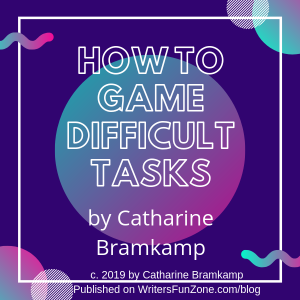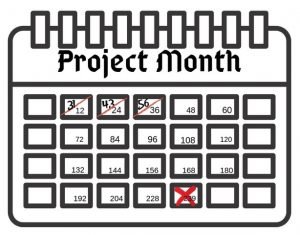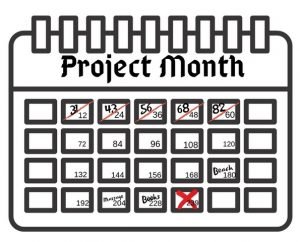How to Game Difficult Tasks by Catharine Bramkamp
 Let’s welcome back monthly columnist Catharine Bramkamp as she shares with us: “How to Game Difficult Tasks.” Enjoy!
Let’s welcome back monthly columnist Catharine Bramkamp as she shares with us: “How to Game Difficult Tasks.” Enjoy!
***
One of the more difficult tasks for writers is managing the boring bits: editing, especially editing that third draft, oh and copy editing, line editing, and well, any editing. By the time I reach the third draft of a book, I’m bored with the story, the premise, the characters, and my own brain.
In fact, I’d be quite happy if I never saw this book again. And why do I need to publish it anyway? Haven’t I finished it? Isn’t it good enough?
Of course, it’s not good enough and to be finished, it needs my review as well as that of a professional copy editor.
It must be done.
I could ask my long suffering spouse to keep me in line, asking the questions: Have you finished that draft? Have you reviewed the already spell checked work?
But that puts him in an unfair lose/lose position.
I needed to create something that worked for me as well as working independently of any outside feedback.
Here is my system.
Here’s how I game these difficult tasks of editing and completing my book.
 It starts with a basic paper calendar: one month on a single page.
It starts with a basic paper calendar: one month on a single page.
On that calendar I calculate when I want the project to be finished.
For this example: the end of the month.
The manuscript is 239 pages. I want to be finished at the end of the month.
A little math, and voila — my goal is to review and correct 12 pages a day to reach my end of the month finish deadline. I take weekends off.
I mark off the total goal for each day: Monday, finish 12 pages. Tuesday, reach 24 pages, etc.
How I Handle Overwhelm
I create these calendars whenever I’m overwhelmed by a task.
Writing down the minimum number needed for success accomplishes the biggest challenge: starting.
I create the calendar on the previous Thursday so it will be ready for the new week of dedicated responsible work.
Day one for the new program is Monday.
But it’s Thursday. A work day. I take a look at my manuscript and can’t resist. I start editing. I finish off ten pages on Thursday, and feeling pretty smug. Then I finish another 9 on Friday.
By Monday, I’m already ahead by 19 pages.
I have now have two choices: call it a day on the first day, or keep going and blow out Monday’s goal.

I always choose to blow out Monday’s goal.
Even if I edit the established minimum pages, by the end of the day, Monday, I will have almost reached Wednesday’s goal. I decide to reach Wednesday’s goal. On Monday. I am stoked. I just overreached, I just succeeded beyond the requirements.
I just cheated on my own game.
This is the gamification of required work.
With Difficult Tasks Use Gamification
Sometimes I recalculate, and either reduce the number of pages I need to finish to reach the end of the month deadline, or I continue to do more than required. I work to exceed each day’s deadline, racking up pages and points.
This overachieving is exciting and satisfying for the whole week.
By week two, I’m over it.
To keep the momentum and motivation, I start moving the finish date.
But maybe finishing early is just that, finishing early. Not terribly inspirational.
What is the difference between finishing on a Wednesday rather than a Friday?
Sure, I’ll be done with an onerous task, but if I’m honest: whatever.
To Keep the Game Moving, Use Incentives
To keep the game moving, I now invent incentives for early completion.
What kind of reward will I earn if I finish the game early?
I create rewards of escalating value. Finish a day ahead of the deadline: win a new hardback book.
Finish two days ahead of deadline: book a massage.
Finish a week ahead of the deadline? Day at the beach.
I do not attach rewards to food or drink.
Did I mention follow through for difficult tasks?
Did I mention follow through?
Follow through.
Even when you finish early and the reward is a day at the beach, unless it’s raining, go to the beach.
Your subconscious remembers everything and if you work yourself into a frenzy to reach a reward, then withhold that reward.
The next time you try this exercise, you’ll meet with more resistance than a cat on a leash.
Be good to yourself and keep your own promises not just for the game, but forever.
May the odds ever be in your favor.
Catharine Bramkamp honed her cheating skills by figuring out how to end every game of Candy Land a half hour early.
Want to know more? Welcome to the free mini course on how to game success.
***
Enjoyed Catharine’s post Check out her other posts on Writer’s Fun Zone here.
***
ABOUT THE AUTHOR
 Catharine Bramkamp is the co-producer of Newbie Writers Podcast that focuses on newer writers and their concerns. She is a successful writing coach, Chief Storytelling Officer, and author of a dozen books including the Real Estate Diva Mysteries series, and The Future Girls series. She holds two degrees in English and is an adjunct university professor. After fracturing her wrist, she has figured out there is very little she is able to do with one hand tied behind her back.
Catharine Bramkamp is the co-producer of Newbie Writers Podcast that focuses on newer writers and their concerns. She is a successful writing coach, Chief Storytelling Officer, and author of a dozen books including the Real Estate Diva Mysteries series, and The Future Girls series. She holds two degrees in English and is an adjunct university professor. After fracturing her wrist, she has figured out there is very little she is able to do with one hand tied behind her back.





